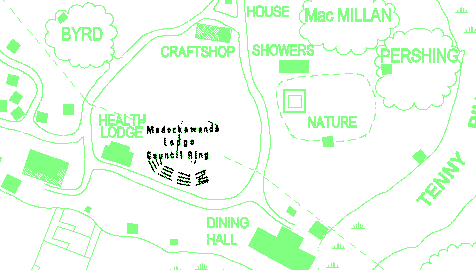

| Our original
Council Ring was located on the slope above the waterfront area, but it
was soon relocated to the present area, a natural bowl facing inland. Because
that bowl has no natural drainage (it’s a glacial “kettle” left over when
the ice melted 12,000 years ago) it fills with water in the spring melt
requiring a lot of pumping to get it dry before camp opens.
Efforts were made in the forties to dry it out by hauling tons of sawdust in as fill. That helped a bit but the sawdust soon decomposed into the soil. In the 80s and 90s some more filling with gravel was done. Originally called the "Comache Council Ring", sometime after 1952 when the Order of the Arrow became an more important part of the camp program, this site was named the “Madockawanda Council Ring,” the name still in use. A regular project over the years has been the construction of fences and benches for the council ring, with the original log seats being replaced several times with plank seats. Some very nice-looking birch fences have rotted away and been replaced with more durable timbers. The current gateway and fence was built by Troop 880 of So. Windsor, CT under the directions of Scoutmaster Bill Neal. The gateway includes two raised platforms where for many years indians stood guarded the entrance on Friday evenings. Madockawanda Lodge has been active in keeping the benches current. In 1994, the 50th anniversary of Madockawanda Lodge, the old council ring benches were ripped out. The area to the right (facing the fire) was filled in with gravel, and benches were then installed to enlarge and renew the council ring. The youth chairman was Chad Wilson, with advisers of his grandfather Charlie Wilson, and father Bud Wilson. In the fifties there was a stage, probably eighteen inches high and twelve feet square in the center of the circle, used for Indian ceremonies, song leaders and skits. It tended to float off its proper site in the spring runoff and rotted away after a few years Visibility was always a problem with the council fire placed behind the song leaders and other programs, and sound was a problem when those people stood behind the fire. We tried having two fireplaces set to both sides of center so that song leaders and skit performers could stand in the center and be seen by firelight. The OA built the two altar fireplaces of stone laid in cement, with a pipe set under each one to enable a wire to be used to trip a “magic” fire lighting. The formula for the chemicals used was written on the window sill of Frank Bailey’s cabin. The council ring was first given electric lighting around 1963, when the power had to come from the craft shop. The lights were mounted on four trees, enabling much more program to be seen, especially in August when early sunsets made for poor viewing. We also tried to solve that problem in the sixties by going on “Camp Hinds time.” On Sunday evening the entire camp was instructed to turn their watches and clocks ahead one hour, giving us that extra hour of daylight in the evening for sports, games, and campfires. It worked well for everyone except visitors who often showed up in camp an hour late for meals or campfires! Many props have been used to decorate the council ring, including several Indian-themed items made by Clyde Nason, Jr, in the 50's and continuing through a series of decorated teepees, a giant Kattywumpus face made by Frank Maguire, the thunderbird made by Chief Kitpou when he visited camp in the early 80's and the totem poles made by campers and staff. |

|
Some have two levels of enlargement) |
 |
|
Dean B. Zaharis Created: October 14, 2010 Last Update: March 29, 2020 Send comments to: FriendsOfHinds@gmail.com |